 W
WTamar Abakelia was a Georgian sculptor, theater designer and illustrator. She was granted the title of Honored Artist of the Georgian SSR in 1942.
 W
WAlexander Abasheli was a penname of Isaac Chochia, a Georgian poet and prose writer.
 W
WPrince Kita (Ivane) Abashidze was a Georgian literary critic, journalist, and politician.
 W
WPavle Abramidze was a Georgian commander in the Soviet military. Promoted to major general in 1940, he commanded the 72nd Mountain Rifle Division during the Battle of Uman in World War II. He was taken prisoner by the German Wehrmacht in August 1941 and remained in captivity until May 1945, when he was repatriated to the Soviet Union.
 W
WGalaktion Yeliseyevich Alpaidze was a Soviet Lieutenant General, Hero of the Soviet Union, chief of the Plesetsk rocket proving ground in 1963–1975, and 1977 laureate of the USSR State Prize.
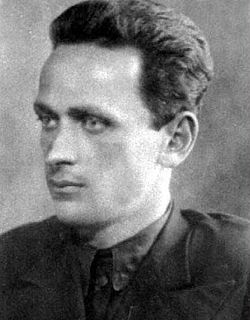 W
WVladimir (Lado) Asatiani was a Georgian poet. His poetic career, lasting only for seven years, made him one of the best-loved Georgian poets of the 20th century.
 W
WHerbert Friedrich Wilhelm Backe was a German politician and SS functionary during the Nazi era. He was a doctrinaire racial ideologue, a long-time associate of Richard Walther Darré and a personal friend of Reinhard Heydrich. He developed and implemented the Hunger Plan that envisioned death by starvation of millions of Slavic and Jewish "useless eaters" following Operation Barbarossa, the 1941 invasion of the Soviet Union.
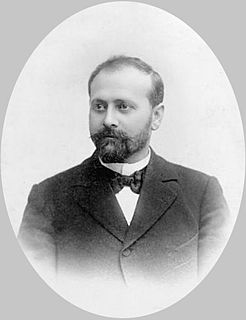 W
WMeliton Balanchivadze was a Georgian opera singer, composer and a celebrated member of Georgia's cultural scene, both under the Russian Empire and during the country's independence. Two of his sons, George and Andria, had illustrious careers, the former as a pioneering choreographer in the United States, and the latter as Soviet Georgia's leading classical composer.
 W
WKandid Charkviani was a Georgian party and government official, and First Secretary of the Communist Party of Georgia from 1938 to 1952.
 W
WParmen Chichinadze was a Georgian Social-Democratic politician and the Minister of War of the Democratic Republic of Georgia from November 1920 to February 1921.
 W
WShalva Konstantinovich Chikhladze was a Soviet light-heavyweight wrestler from Georgia. He won a silver medal in the Greco-Roman light-heavyweight division at the 1952 Summer Olympics.
 W
WSimon Chikovani was a Georgian poet who set out to be the leader of Georgian Futurist movement and ended up as a Soviet establishment figure.
 W
WNikoloz Semyonovich Chkheidze, commonly known as Karlo Chkheidze, was a Georgian politician. In the 1890s, he promoted Social Democratic movement in Georgia. He became a key figure in the Russian Revolution as the Menshevik president of the Executive Committee of the Soviet of Petrograd. Later he served as president of the Transcaucasian Sejm, and he held office in the Transcaucasian Democratic Federative Republic. Later he became president of parliamentary assemblies of the Democratic Republic of Georgia, National Council, Constituent Assembly and Parliament.
 W
WChristophorus III was a Catholicos-Patriarch of All Georgia from 1927 until his death.
 W
WShalva Dadiani was a Georgian novelist, playwright, and a theatre actor.
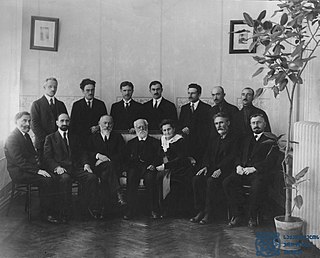 W
WSeit Devdariani was a Georgian philosopher and political activist who was executed during Joseph Stalin's Great Purge.
 W
WIvan Antonovich Dumbadze was a Major-General of H. I. M. Retinue of Nicholas II, Supreme Head of Yalta, one of the activists of the Union of Russian People, notorious for his antisemitic and extravagant escapades.
 W
WProkofy "Alyosha" Aprasionovich Dzhaparidze or Japaridze,, was a Communist activist, one of the Red Army and Bolshevik Party leaders in Azerbaijan during the Russian Revolution.
 W
WYakov Iosifovich Dzhugashvili was the eldest of Joseph Stalin's three children, the son of Stalin's first wife, Kato Svanidze, who died 9 months after his birth. His father, then a young revolutionary in his mid-20s, left the child to be raised by his late wife's family. In 1921, when Dzhugashvili had reached the age of fourteen, he was brought to Moscow, where his father had become a leading figure in the Bolshevik government who eventually became head of the Soviet Union. Disregarded by Stalin, Dzhugashvili was a shy, quiet child who appeared quite unhappy and tried to commit suicide several times as a youth. Married twice, Dzhugashvili had three children, two of whom reached adulthood.
 W
WShalva Eliava was a Georgian Old Bolshevik and Soviet official who contributed to the Sovietization of Central Asia and Caucasus but fell victim to Joseph Stalin’s Great Purge.
 W
WKonstantine Gamsakhurdia was a Georgian writer and public figure. Educated and first published in Germany, he married Western European influences to purely Georgian thematic to produce his best works, such as The Right Hand of the Grand Master and David the Builder. Hostile to the Soviet rule, he was, nevertheless, one of the few leading Georgian writers to have survived the Stalin-era repressions, including his exile to a White Sea island and several arrests. His works are noted for their character portrayals of great psychological insight. Another major feature of Gamsakhurdia's writings is a new subtlety he infused into Georgian diction, imitating an archaic language to create a sense of classicism.
 W
WAleksi "Sasha" Gegechkori was a Georgian Bolshevik activist involved in Sovietization of Georgia in 1921.
 W
WEvgeni Gegechkori was a Georgian nobleman, politician, and Social Democratic revolutionary.
 W
WArchil Viktorovich Gelovani was a Soviet officer and later Marshal of the engineer troops, responsible for logistics, fortification and military infrastructure during and after World War II. He was tasked on several occasions with fortifying strategically important areas and also reconstruction, including all Black Sea ports during and after World War II. He served primarily on military engineering and defense strategy posts, including being the Deputy Minister of Defence and would play a major role in the structural development of the Soviet armed forces and strategic missile forces during the Cold War era. An avenue in Georgia's capital Tbilisi and a street in the city of Sevastopol have been named after Marshal Gelovani.
 W
WPrince Varlam Gelovani was a Georgian lawyer and politician in the Russian Empire.
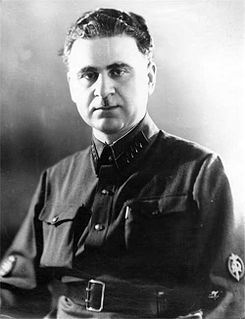 W
WSergo Goglidze was a Soviet NKVD official of Georgian ethnicity.
 W
WValerian "Valiko" Gunia was a Georgian dramatist, actor, director, critic, and translator. His contribution to the Georgian scene won him the title of People's Artist in 1934.
 W
WSimon Janashia was a Georgian historian and public figure. He was a professor of history and one of the founding members of the Georgian Academy of Sciences.
 W
WVladimir Nikolayevich Janjgava was a Georgian Soviet Army Lieutenant General and Hero of the Soviet Union who participated in battles during the Winter War and was a specialist in infantry warfare during World War II. Janigava held command of various infantry regiments, divisions and corps of the Soviet Army. Janjgava served in a series of leadership roles after the war, including as Minister of Internal Affairs of Georgian SSR (1954—1958).
 W
WDavit' Kakabadze was one of the leading Georgian avant-garde painter, graphic artist and scenic designer. A multi-talent, he was also an art scholar and innovator in the field of cinematography as well as an amateur photographer. Kakabadze's works are notable for combining innovative interpretation of European "Leftist" art with Georgian national traditions, on which he was an expert.
 W
WSergey or Sergo Kavtaradze was a Soviet politician and diplomat who briefly served as head of government in the Georgian SSR and as Deputy Prosecutor General of the Soviet Union. A Georgian Bolshevik activist, he was persecuted for his Trotskyist activities, but was pardoned and reinstated by his personal friend Joseph Stalin.
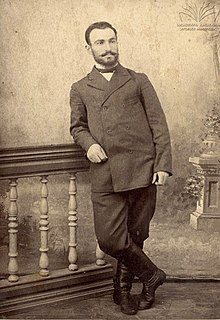 W
WAkaki Khoshtaria was a Georgian entrepreneur, socialite, and philanthropist. His principal business interests centered on oil industry in Azerbaijan and northern Iran.
 W
WShalva Kikodze (1894–1921) was a Georgian expressionist painter, graphic artist and theatre decorator. Together with Lado Gudiashvili and David Kakabadze, he is considered a key figure in Georgian art of the early 20th century.
 W
WKonstantin Nikolaevich Leselidze, was a Colonel-General and Hero of the Soviet Union who distinguished himself at the North, Transcaucasus and Ukrainian front during World War II. He was also the elder brother of Viktor Nikolaevich Leselidze
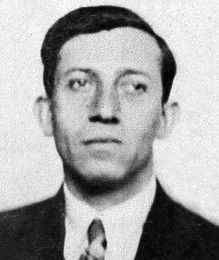 W
WGrigory Moiseevich Mairanovsky was a Soviet biochemist and poison developer.
 W
WFilipp Yeseyevich Makharadze was a Georgian Bolshevik revolutionary and government official.
 W
WNikolai Yakovlevich Marr was a Georgia-born historian and linguist who gained a reputation as a scholar of the Caucasus during the 1910s before embarking on his "Japhetic theory" on the origin of language, now considered as pseudo-scientific, and related speculative linguistic hypotheses.
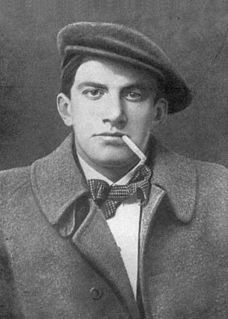 W
WVladimir Vladimirovich Mayakovsky was a Russian and Soviet poet, playwright, artist, and actor.
 W
WAkaki Mgeladze was a Soviet politician. He served as First Secretary of the Georgian Communist Party from 1952 to 1953, and before that was First Secretary of the Abkhazian Communist Party from 1943 until 1951, as well as previously leading both the Georgian and Abkhazian Komsomol and Gruzneft.
 W
WVladimir Ivanovich Nemirovich-Danchenko, was a Russian and Soviet theatre director, writer, pedagogue, playwright, producer and theatre administrator, who founded the Moscow Art Theatre with his colleague, Konstantin Stanislavski, in 1898.
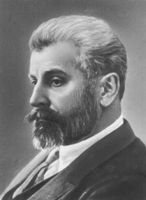 W
WMamia Orakhelashvili was a Georgian Bolshevik and Soviet politician energetically involved in the revolutionary movement in Russia and Georgia.
 W
WSergo Konstantinovich Ordzhonikidze, born Grigol Konstantines dze Orjonikidze, was a Georgian Bolshevik and Soviet politician.
 W
WMinadora Orjonikidze was a Georgian politician, active in the Democratic Republic of Georgia and its Constituent Assembly. Trained as a physician at the University of Geneva, Orjonikidze became familiar with Marxism while there, and married Malakia Toroshelidze, a fellow Georgian Marxist while studying there. On their return to Georgia Orjonikidze became an active member of the revolutionary movement, though with the 1905 split between Bolsheviks and Mensheviks she follow the majority of Georgians and became a Menshevik. When the Georgian Democratic Republic declared independence on 26 May 1918 Orjonikidze was one of five women who signed the declaration, and was elected to the Constituent Assembly.
 W
WWładysław Raczkiewicz was a Polish politician, lawyer, diplomat and the first president of the Polish government-in-exile from 1939 until his death in 1947. Until 1945, he was the internationally recognized Polish head of state, and the Polish Government in Exile was recognized as the continuum to the Polish government of 1939.
 W
WIsidore Ramishvili was a Georgian Social Democratic politician, journalist, and one of the leaders of Menshevik movement in Imperial Russia.
 W
WKristine Sharashidze was a Georgian politician, active in the Democratic Republic of Georgia and its Constituent Assembly.
 W
WDimitri Shevardnadze was a Georgian painter, art collector and intellectual purged during Joseph Stalin's repressions.
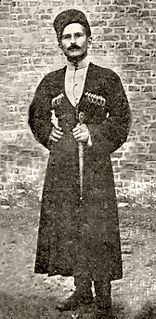 W
WAlexander Semyonovich "Alyosha" Svanidze was a Georgian Old Bolshevik and historian. He was a personal friend of Joseph Stalin and a brother of Stalin’s first wife Kato. Nevertheless, Stalin had him arrested during a purge in 1937. He was shot in prison in 1941.
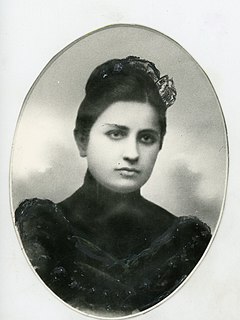 W
WEkaterine "Kato" Svanidze was the first wife of Joseph Stalin and the mother of his eldest son, Yakov.
 W
WGalaktion Tabidze, simply referred to as Galaktioni, was a Georgian poet of the twentieth century whose writings profoundly influenced all subsequent generations of Georgian poets. He survived Joseph Stalin's Great Purge of the 1930s, which claimed lives of many of his fellow writers, friends and relatives, but came under heavy pressure from the Soviet authorities. Those years plunged him into depression and alcoholism. He was placed in a psychiatric hospital in Tbilisi, where he committed suicide.
 W
WTitsian Tabidze, was a Georgian poet and one of the leaders of Georgian symbolist movement. He fell victim to Joseph Stalin's Great Purge, was arrested and executed on trumped-up charges of treason. Tabidze was a close friend of the well-known Russian writer Boris Pasternak who translated his poetry into Russian.
 W
WEkvtime Takaishvili was a Georgian historian, archaeologist and public benefactor.
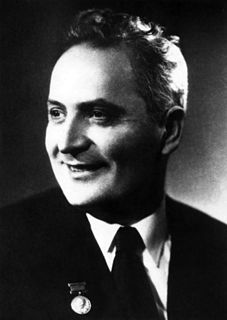 W
WDimitri Tavadze was a Georgian artist and scenographer.
 W
WTamara Semyonovna Tsereteli was a Georgian Russian singer, contralto, who specialized in the Russian romance and was the first to record in 1925 Boris Fomin's "Dorogoi dlinnoyu".
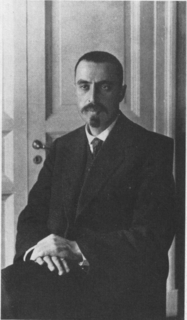 W
WIrakli Tsereteli was a Georgian politician and a leading spokesman of the Social Democratic Party of Georgia and later Russian Social Democratic Labour Party (RSDLP) during the era of the Russian Revolutions.
 W
WMikhail Grigoryevich Tskhakaya, also known as Barsov, was a Georgian communist. Barsov was a senior leader in the Bolshevik movement in Georgia, having been active in revolutionary politics since 1880. He was one of the five signatories of the Document that formed Soviet Union.
 W
WAvel Safronovich Yenukidze was a prominent Georgian "Old Bolshevik" and, at one point, a member of the Soviet Central Committee in Moscow. In 1932, along with Mikhail Kalinin and Vyacheslav Molotov, Yenukidze co-signed the infamous "Law of Spikelets". In 1918 to 1935 Yenukidze served as a secretary of the All-Russian Central Executive Committee and the Central Executive Committee of the Soviet Union.
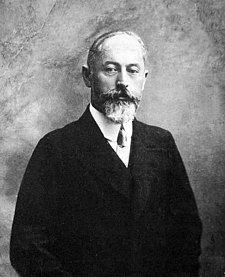 W
WNoe Zhordania was a Georgian journalist and Menshevik politician. He played an eminent role in the socialist revolutionary movement in the Russian Empire, and later chaired the government of the Democratic Republic of Georgia from July 24, 1918 until March 18, 1921, when the Bolshevik Russian Red Army invasion of Georgia forced him into exile to France. There Zhordania led the government-in-exile until his death in 1953.